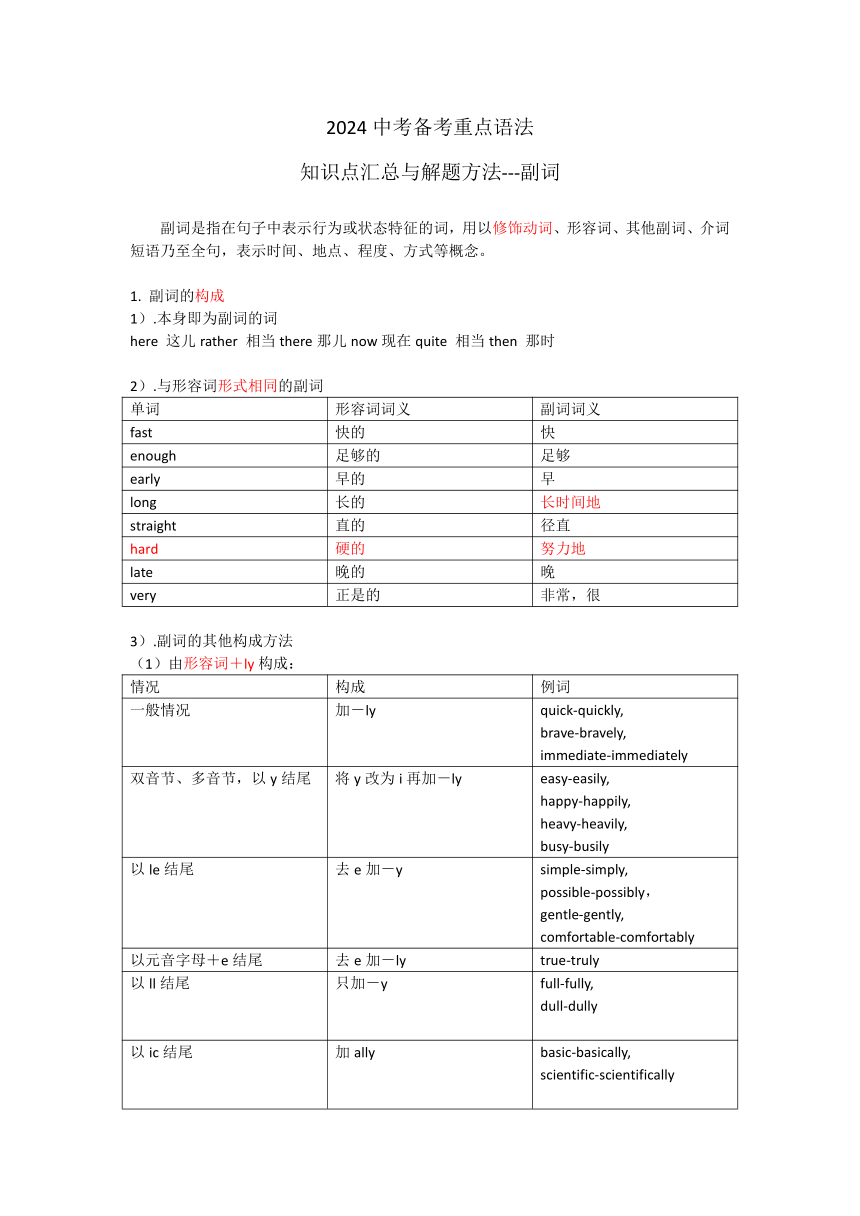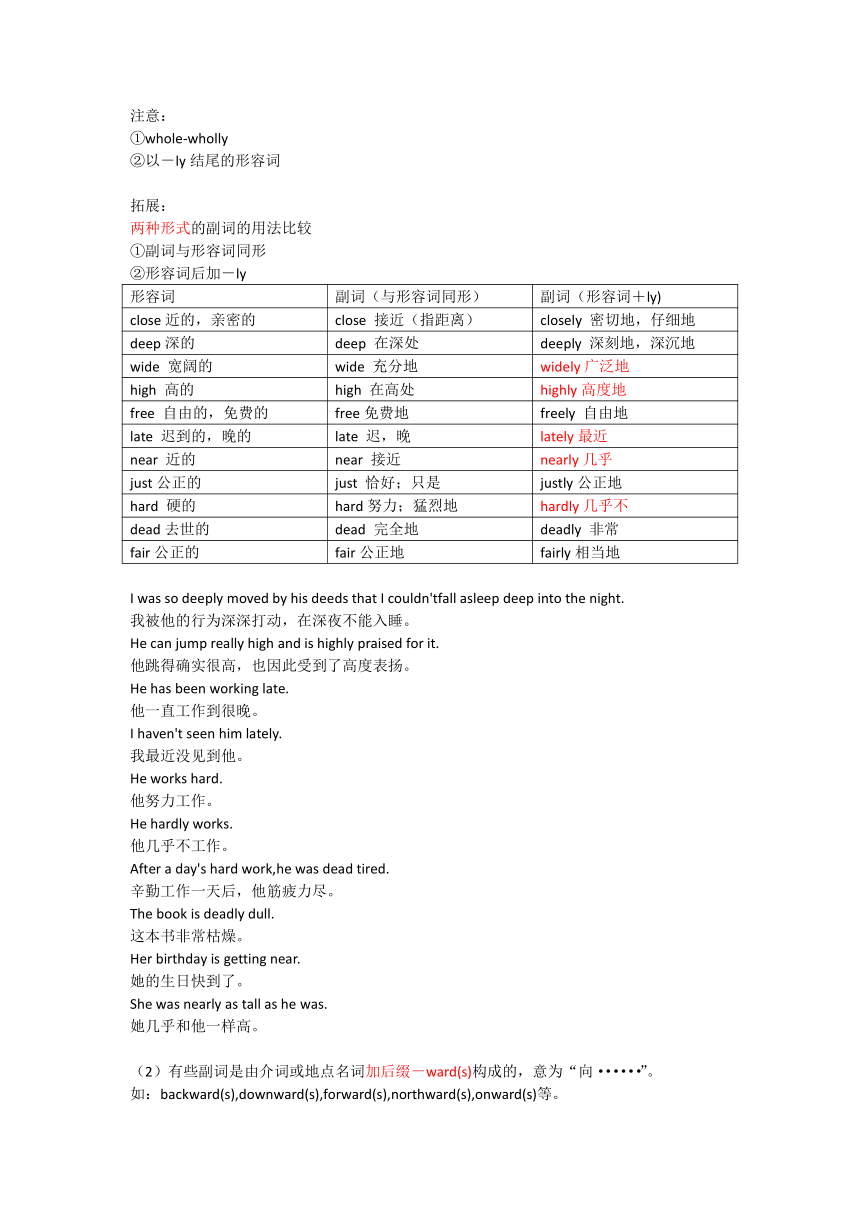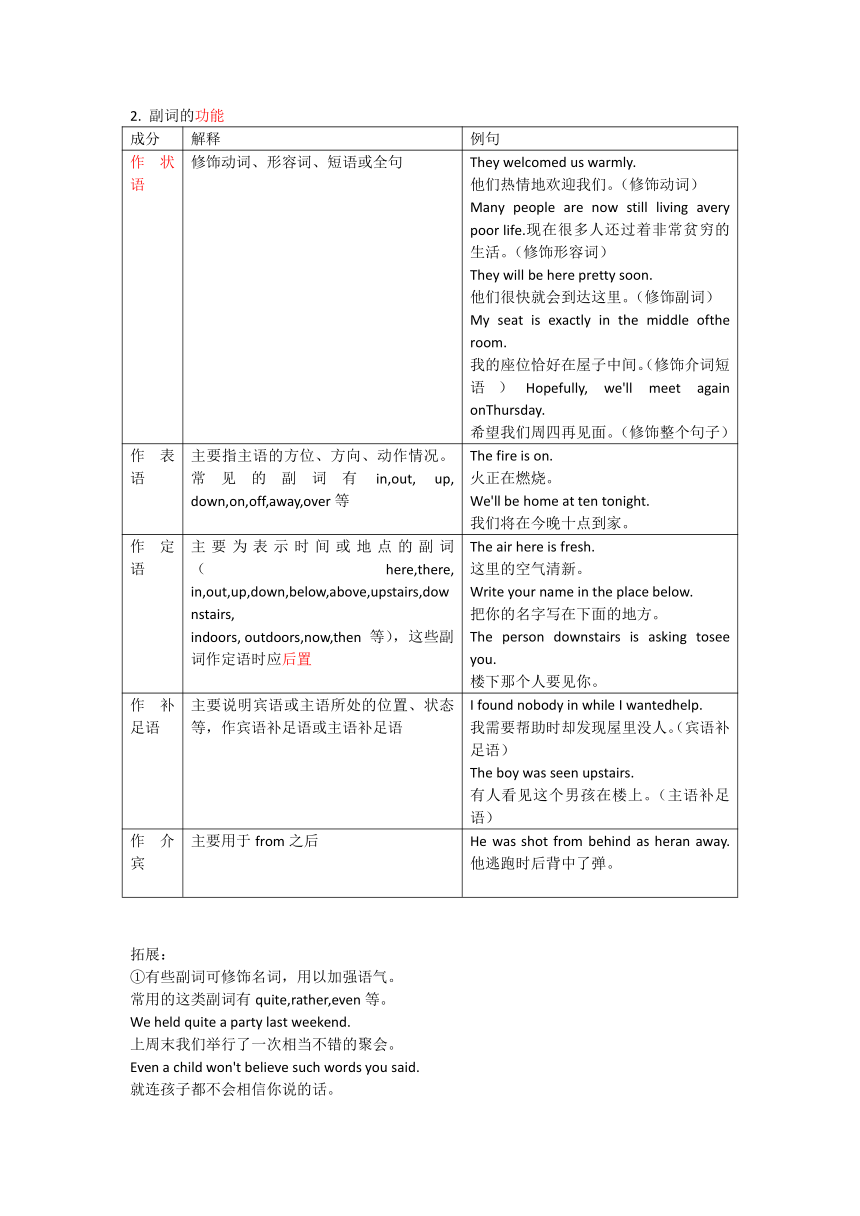2024年英语中考备考重点语法知识点汇总与解题方法---副词讲义(含解析)
文档属性
| 名称 | 2024年英语中考备考重点语法知识点汇总与解题方法---副词讲义(含解析) |  | |
| 格式 | docx | ||
| 文件大小 | 31.2KB | ||
| 资源类型 | 教案 | ||
| 版本资源 | 通用版 | ||
| 科目 | 英语 | ||
| 更新时间 | 2023-10-21 09:56:51 | ||
图片预览




文档简介
2024中考备考重点语法
知识点汇总与解题方法---副词
副词是指在句子中表示行为或状态特征的词,用以修饰动词、形容词、其他副词、介词短语乃至全句,表示时间、地点、程度、方式等概念。
1. 副词的构成
1).本身即为副词的词
here 这儿rather 相当there那儿now现在quite 相当then 那时
2).与形容词形式相同的副词
单词 形容词词义 副词词义
fast 快的 快
enough 足够的 足够
early 早的 早
long 长的 长时间地
straight 直的 径直
hard 硬的 努力地
late 晚的 晚
very 正是的 非常,很
3).副词的其他构成方法
(1)由形容词+ly构成:
情况 构成 例词
一般情况 加-ly quick-quickly, brave-bravely, immediate-immediately
双音节、多音节,以y结尾 将y改为i再加-ly easy-easily, happy-happily, heavy-heavily, busy-busily
以le结尾 去e加-y simple-simply, possible-possibly, gentle-gently, comfortable-comfortably
以元音字母+e结尾 去e加-ly true-truly
以ll结尾 只加-y full-fully, dull-dully
以ic结尾 加ally basic-basically, scientific-scientifically
注意:
①whole-wholly
②以-ly结尾的形容词
拓展:
两种形式的副词的用法比较
①副词与形容词同形
②形容词后加-ly
形容词 副词(与形容词同形) 副词(形容词+ly)
close近的,亲密的 close 接近(指距离) closely 密切地,仔细地
deep深的 deep 在深处 deeply 深刻地,深沉地
wide 宽阔的 wide 充分地 widely广泛地
high 高的 high 在高处 highly高度地
free 自由的,免费的 free免费地 freely 自由地
late 迟到的,晚的 late 迟,晚 lately最近
near 近的 near 接近 nearly几乎
just公正的 just 恰好;只是 justly公正地
hard 硬的 hard努力;猛烈地 hardly几乎不
dead去世的 dead 完全地 deadly 非常
fair公正的 fair公正地 fairly相当地
I was so deeply moved by his deeds that I couldn'tfall asleep deep into the night.
我被他的行为深深打动,在深夜不能入睡。
He can jump really high and is highly praised for it.
他跳得确实很高,也因此受到了高度表扬。
He has been working late.
他一直工作到很晚。
I haven't seen him lately.
我最近没见到他。
He works hard.
他努力工作。
He hardly works.
他几乎不工作。
After a day's hard work,he was dead tired.
辛勤工作一天后,他筋疲力尽。
The book is deadly dull.
这本书非常枯燥。
Her birthday is getting near.
她的生日快到了。
She was nearly as tall as he was.
她几乎和他一样高。
(2)有些副词是由介词或地点名词加后缀-ward(s)构成的,意为“向······”。
如:backward(s),downward(s),forward(s),northward(s),onward(s)等。
2. 副词的功能
成分 解释 例句
作状语 修饰动词、形容词、短语或全句 They welcomed us warmly. 他们热情地欢迎我们。(修饰动词) Many people are now still living avery poor life.现在很多人还过着非常贫穷的生活。(修饰形容词) They will be here pretty soon. 他们很快就会到达这里。(修饰副词) My seat is exactly in the middle ofthe room. 我的座位恰好在屋子中间。(修饰介词短语)Hopefully, we'll meet again onThursday. 希望我们周四再见面。(修饰整个句子)
作表语 主要指主语的方位、方向、动作情况。常见的副词有in,out, up, down,on,off,away,over等 The fire is on. 火正在燃烧。 We'll be home at ten tonight. 我们将在今晚十点到家。
作定语 主要为表示时间或地点的副词(here,there, in,out,up,down,below,above,upstairs,downstairs, indoors, outdoors,now,then 等),这些副词作定语时应后置 The air here is fresh. 这里的空气清新。 Write your name in the place below. 把你的名字写在下面的地方。 The person downstairs is asking tosee you. 楼下那个人要见你。
作补足语 主要说明宾语或主语所处的位置、状态等,作宾语补足语或主语补足语 I found nobody in while I wantedhelp. 我需要帮助时却发现屋里没人。(宾语补足语) The boy was seen upstairs. 有人看见这个男孩在楼上。(主语补足语)
作介宾 主要用于from之后 He was shot from behind as heran away.他逃跑时后背中了弹。
拓展:
①有些副词可修饰名词,用以加强语气。
常用的这类副词有quite,rather,even等。
We held quite a party last weekend.
上周末我们举行了一次相当不错的聚会。
Even a child won't believe such words you said.
就连孩子都不会相信你说的话。
②有些副词可修饰部分不定代词和数词。
常用的这类副词有almost,nearly,roughly,mostly等。
Nearly anyone present at the meeting was an experton bird flu.
参加这次会议的人几乎都是禽流感方面的专家。
I learned three foreign languages at college,but nowI have forgotten almost all of them.
我上大学时学过三门外语,可现在几乎全忘了。
3.副词的分类
分类 例词
时间副词 recently,ago,today,now,then,soon,lately
地点副词 here,there,downstairs,outdoors
方式副词 happily,directly,clearly,nicely
程度副词 much,enough,almost,very,so,quite,rather,too
频度副词 often,always,usually,seldom,sometimes, once, twice,
关系副词 when,why,where
疑问副词 when,where,how,why
连接副词 why,when,where
评论性副词 luckily,honestly,hopefully,sadly
其他副词 no,not,sure (ly)
4.副词的位置
类型 用法 例句
时间副词和地点副词一般放在句尾 如果这两种副词同时出现在句中,则把地点副词放在时间副词的前面,也可把时间副词放在句首 They wentboating in Zhongshan Park yesterday. =Yesterday theywentboatinginZhongshanPark. 他们昨天去中山公园划船了。
频度副词的位置 在实义动词之前,情态动词、助动词或连系动词之后 Tom quite often goes tohis mum's on Saturdays fortea. 汤姆星期六经常去他妈妈家喝茶。
修饰全句的副词 若放在句中或句末,必须加逗号,若位于句首则可有可无 Nothing,certainly,is moreimportant than health. 的确,没有什么比健康更重要的了。He escaped being killedin the car accident,fortunately. 幸运的是,他没有在车祸中丧命。
评论性副词 此类副词往往置于句首 Honestly,he is unfit forthe job. 说实话,他不适合这份工作。Fortunately,he was notdrowned and was saved bya PLA man. 幸运的是,他没被淹死,被一个解放军战士救了。
在“动词+副词”结构中 所构成的动词短语中,宾语是代词时,放在动词与副词之间;宾语是名词时,位于副词前后皆可;宾语是短语、句子时,放在副词之后 (1)把它放下。 [正]Put it down. [误]Put down it. (2)把你的书放下。 [正]Put down your book. [正]Put your book down. (3)把你不用的(东西)放下。 [正]Put down whateveryou don't use. [误]Put whatever youdon't use down.
副词修饰名词 一般放在该名词之后;副词(如well,right,just,soon等)修饰介词时,放在该介词之前。 Thepersonthereislooking for you. 那儿的那个人在找你。 There's a house,right infront of you. 恰好在你前面就有座房子。 Much to our surprise,hefailed the exam. 令我们十分吃惊的是他竟然没通过考试。
否定副词 常见的否定副词有never,seldom,rarely,hardly,scarcely,little等,放在句首时要将助动词、be动词或情态动词放在主语之前,即用部分倒装语序 Never have I seen such athing in my college days. 我上大学时从未看过这样的东西。
拓展:
频度副词在“主语+助动词/be/情态动词”的省略形式中,必须放在助动词/be/情态动词之前
-Don't trust politicians.
不要相信政客。
-I never have and I never will.
我从未相信过,将来也不会。
5.副词的比较级和最高级
1).副词的比较级和最高级的构成
(1)规则构成:
与形容词的比较级和最高级的构成、用法及读音完全相同。er、est
(2)不规则构成
原级 比较级 最高级
well better best
badly worse worst
much more most
little less least
far farther(指距离) further(指距离和抽象概念) farthest(指距离) furthest(指距离和抽象概念)
2).副词的比较等级的用法
副词的原级、比较级及最高级的用法和结构均与形容词相对应的用法和结构一致。
用法上,只需将结构中形容词换成副词即可。
详见形容词的比较等级用法。
This kind of language appeared as early as the StoneAge.
这种语言最早出现在石器时代。
It doesn't rain so/as frequently here as it does in mycountry.
这里不如我们国家下雨频繁。
Anthony is out of shape. I can run faster and fartherthan he.
安东尼身体不好。我跑得比他快而且比他跑得远。
The car is running less smoothly than it used to.
这辆汽车跑得没有过去平稳了。
I don't run faster than anyone else in my class.
我不如班里的其他人跑得快。
The more we know each other,the better we under-stand each other.
我们之间了解得越多,就越能互相理解。
The fire spread further and further with the wind blowing more and more strongly.
随着风越刮越大,大火蔓延得越来越远。
Of all the subjects, I like art (the) best.
在所有课程中,我最喜欢美术。
3).副词的比较级和最高级的修饰语
同形容词的比较级和最高级的修饰语,详见形容词的用法。
Eleanor speaks Japanese a lot better than before.
埃莉诺日语说得比以前好多了。
You are working harder by far this time.
你这次工作更卖力了。
6.解题方法
1)准确翻译法
副词的考查在中考试题中比较多,在解答试题时要根据具体的语境辨析所给选项。具体来说,要注意:
(1)一些副词的具体含义;
(2)一些副词在具体句子中的辨析。
2) 重点句型判断法
中考中对于副词的考查要注意原级、比较级和最高级的基本句型。
具体来说要注意下面几点:
(1)判断该句型是哪一种句型;
(2)能够根据句子中的一些修饰语做出正确的判断
(3)还有固定短语的考查。
练习题:
1.A sudden stop can be a very frightening experience,__________(especial) if you are travelling at high speed.
2.Thanks for your directions to the house;wewouldn't have found it______.
A.nowhereB.howeverC.otherwise D.instead
3.Playing on a frozen sports field sounds like alot of fun. Isn't it rather risky, _________
A.thoughB.alsoC.eitherD.too
4. It's our hope that we will play a greater role inthe market place and,_______ ,supply more jobs.
5. What a terrible experience!________,you'resafe now-that's the main thing.
6.We only had $100 and that was _____to buy anew computer.
A.nowhere near enoughB.near enough nowhere
C.enough near nowhereD.near nowhere enough
7.Next to biology, I like physics_________.
A.betterC.the betterB.bestD.very well
8. Henry was away from home for quite a bit and ______saw his family.
A.frequently B.seldomC.alwaysD.usually
9. If what your friend comes up with surprises you,don't reject it immediately._______,imagine that it is true.
A. ThusB. BesidesC. RatherD. Otherwise
10. I wasn't blaming anyone; I_______ said errorslike this could be avoided.
A.merelyB.mostlyC.rarelyD.nearly
11. A society cannot be successful if it throws tradition away,but it cannot be successful______if we dosomething to stop progress.
12.---Have you got accustomed to your new job
-Well,yes. It's not as good as I expected,_______ .
I can't thank you _______much for your help.Without it I couldn't have succeeded in my experiment.
A.veryB.tooC.quiteD.that
14.---Our women athletes achieved great successin the Vancouver Olympic Winter Games.
-Yes. No one could perform_________,I think.
A.wellB.betterC.bestD.the best
15.Tony can hardly boil an egg,still______(little) cook dinner.
16.---What did you do last weekend
-Oh,nothing_________.
答案
1.句意;突然停止会是很可怕的经历,尤其是如果你以高速行进。设空处需用副词修饰if引导的状语从句,故答案为especially(尤其)。
2.句意:谢谢你为我们指路,要不然我们找不到那所房子。本题考查副词辨析。otherwise 否则,不然;nowhere 哪里都不;however 然而;instead 反而,却。根据语境可知,答案为C项。
3.句意:在结冰的体育场上玩耍听起来很有趣。但难道不是很危险吗?本题考查副词辨析。分析语境可知两个句子之间存在转折关系,B、C和D三项都没有此用法;though有此用法,而且表转折时要放在句尾,通常用逗号和前面的内容隔开。答案A
4.句意:我们希望我们能在市场上发挥更大的作用,这样就能提供更多的工作岗位。根据句意可知前后是逻辑上的因果关系,故答案为therefore.
5.句意:多么可怕的一次经历啊!不过,你现在安全了-那才是主要的事情。anyway/anyhow意为“不过”。答案 Anyway/Anyhow
6.句意:我们只有100美元,离买台新电脑的钱还差得远呢。本题考查修饰词顺序。Notanywhere near 或 nowhere near:far from,not at all 远非,绝不是,为固定短语。答案A
7.句意:我最喜欢的是生物,其次是物理。本题考查副词的比较等级。首先要搞清 next to的用法。next to:followingin order or importance after sb. /sth. 仅次于,紧接。又如:Next to soccer,I like playingtennis best. 我最喜欢足球,其次是网球。答案 B
8.句意:亨利离开家很长时间了,很少见到他的家人。考查副词辨析。A:频繁,经常;B:很少;C:总是;D:通常。根据语境可知,由于离家很久,所以很少见到他的家人。故选B项。
9.句意:如果你的朋友提出的东西让你吃惊,不要立即拒绝接受,而是假设那是对的。本题考查副词词义辨析。根据句意,此处指“相反,而是”,只有C项合适。答案C
10.句意:我并没有责怪任何人,我只是说像这样的错误是可以避免的。本题考查副词辨析。从语境看,这里用merely表示“只是,仅仅”。merely:adv.only;simply 仅,只,不过。mostly:almost all;rarely 很少,难得,异乎寻常地。nearly不完全地,几乎,很接近地。
答案 A
句意:如果一个社会丢弃了传统,它不会成功,但是如果我们做事情阻止了进步它也不能成功。either用于否定句句末,表示“也”。答案either
12.句意:-你适应了你的新工作了吗?-哦,适应了。不过它不像我预计的那么好。though 置于句末,作副词,意为“不过,可是,然而”。答案though
13.句意:我非常感谢您的帮助。没有您的帮助,我就不可能完成我的实验。can't+v.+too much 表示“无论怎样······也不过分”,故选择B项。答案 B
14.句意:-我们的女运动员在温哥华冬奥会上取得了成功。-是的,我认为没有人比她们表现得更好了。否定词+比较级=最高级,故选择B项。答案 B
15.句意:Tony几乎不会煮蛋,更不用说做饭了。still less 为固定搭配,常与否定句连用,意为:更不用说,更何况。答案 less
16.句意:-上周末你做什么了?-哦,没做什么。nothing much是一个习惯用法,意思是“没什么”,符合语境。答案much
知识点汇总与解题方法---副词
副词是指在句子中表示行为或状态特征的词,用以修饰动词、形容词、其他副词、介词短语乃至全句,表示时间、地点、程度、方式等概念。
1. 副词的构成
1).本身即为副词的词
here 这儿rather 相当there那儿now现在quite 相当then 那时
2).与形容词形式相同的副词
单词 形容词词义 副词词义
fast 快的 快
enough 足够的 足够
early 早的 早
long 长的 长时间地
straight 直的 径直
hard 硬的 努力地
late 晚的 晚
very 正是的 非常,很
3).副词的其他构成方法
(1)由形容词+ly构成:
情况 构成 例词
一般情况 加-ly quick-quickly, brave-bravely, immediate-immediately
双音节、多音节,以y结尾 将y改为i再加-ly easy-easily, happy-happily, heavy-heavily, busy-busily
以le结尾 去e加-y simple-simply, possible-possibly, gentle-gently, comfortable-comfortably
以元音字母+e结尾 去e加-ly true-truly
以ll结尾 只加-y full-fully, dull-dully
以ic结尾 加ally basic-basically, scientific-scientifically
注意:
①whole-wholly
②以-ly结尾的形容词
拓展:
两种形式的副词的用法比较
①副词与形容词同形
②形容词后加-ly
形容词 副词(与形容词同形) 副词(形容词+ly)
close近的,亲密的 close 接近(指距离) closely 密切地,仔细地
deep深的 deep 在深处 deeply 深刻地,深沉地
wide 宽阔的 wide 充分地 widely广泛地
high 高的 high 在高处 highly高度地
free 自由的,免费的 free免费地 freely 自由地
late 迟到的,晚的 late 迟,晚 lately最近
near 近的 near 接近 nearly几乎
just公正的 just 恰好;只是 justly公正地
hard 硬的 hard努力;猛烈地 hardly几乎不
dead去世的 dead 完全地 deadly 非常
fair公正的 fair公正地 fairly相当地
I was so deeply moved by his deeds that I couldn'tfall asleep deep into the night.
我被他的行为深深打动,在深夜不能入睡。
He can jump really high and is highly praised for it.
他跳得确实很高,也因此受到了高度表扬。
He has been working late.
他一直工作到很晚。
I haven't seen him lately.
我最近没见到他。
He works hard.
他努力工作。
He hardly works.
他几乎不工作。
After a day's hard work,he was dead tired.
辛勤工作一天后,他筋疲力尽。
The book is deadly dull.
这本书非常枯燥。
Her birthday is getting near.
她的生日快到了。
She was nearly as tall as he was.
她几乎和他一样高。
(2)有些副词是由介词或地点名词加后缀-ward(s)构成的,意为“向······”。
如:backward(s),downward(s),forward(s),northward(s),onward(s)等。
2. 副词的功能
成分 解释 例句
作状语 修饰动词、形容词、短语或全句 They welcomed us warmly. 他们热情地欢迎我们。(修饰动词) Many people are now still living avery poor life.现在很多人还过着非常贫穷的生活。(修饰形容词) They will be here pretty soon. 他们很快就会到达这里。(修饰副词) My seat is exactly in the middle ofthe room. 我的座位恰好在屋子中间。(修饰介词短语)Hopefully, we'll meet again onThursday. 希望我们周四再见面。(修饰整个句子)
作表语 主要指主语的方位、方向、动作情况。常见的副词有in,out, up, down,on,off,away,over等 The fire is on. 火正在燃烧。 We'll be home at ten tonight. 我们将在今晚十点到家。
作定语 主要为表示时间或地点的副词(here,there, in,out,up,down,below,above,upstairs,downstairs, indoors, outdoors,now,then 等),这些副词作定语时应后置 The air here is fresh. 这里的空气清新。 Write your name in the place below. 把你的名字写在下面的地方。 The person downstairs is asking tosee you. 楼下那个人要见你。
作补足语 主要说明宾语或主语所处的位置、状态等,作宾语补足语或主语补足语 I found nobody in while I wantedhelp. 我需要帮助时却发现屋里没人。(宾语补足语) The boy was seen upstairs. 有人看见这个男孩在楼上。(主语补足语)
作介宾 主要用于from之后 He was shot from behind as heran away.他逃跑时后背中了弹。
拓展:
①有些副词可修饰名词,用以加强语气。
常用的这类副词有quite,rather,even等。
We held quite a party last weekend.
上周末我们举行了一次相当不错的聚会。
Even a child won't believe such words you said.
就连孩子都不会相信你说的话。
②有些副词可修饰部分不定代词和数词。
常用的这类副词有almost,nearly,roughly,mostly等。
Nearly anyone present at the meeting was an experton bird flu.
参加这次会议的人几乎都是禽流感方面的专家。
I learned three foreign languages at college,but nowI have forgotten almost all of them.
我上大学时学过三门外语,可现在几乎全忘了。
3.副词的分类
分类 例词
时间副词 recently,ago,today,now,then,soon,lately
地点副词 here,there,downstairs,outdoors
方式副词 happily,directly,clearly,nicely
程度副词 much,enough,almost,very,so,quite,rather,too
频度副词 often,always,usually,seldom,sometimes, once, twice,
关系副词 when,why,where
疑问副词 when,where,how,why
连接副词 why,when,where
评论性副词 luckily,honestly,hopefully,sadly
其他副词 no,not,sure (ly)
4.副词的位置
类型 用法 例句
时间副词和地点副词一般放在句尾 如果这两种副词同时出现在句中,则把地点副词放在时间副词的前面,也可把时间副词放在句首 They wentboating in Zhongshan Park yesterday. =Yesterday theywentboatinginZhongshanPark. 他们昨天去中山公园划船了。
频度副词的位置 在实义动词之前,情态动词、助动词或连系动词之后 Tom quite often goes tohis mum's on Saturdays fortea. 汤姆星期六经常去他妈妈家喝茶。
修饰全句的副词 若放在句中或句末,必须加逗号,若位于句首则可有可无 Nothing,certainly,is moreimportant than health. 的确,没有什么比健康更重要的了。He escaped being killedin the car accident,fortunately. 幸运的是,他没有在车祸中丧命。
评论性副词 此类副词往往置于句首 Honestly,he is unfit forthe job. 说实话,他不适合这份工作。Fortunately,he was notdrowned and was saved bya PLA man. 幸运的是,他没被淹死,被一个解放军战士救了。
在“动词+副词”结构中 所构成的动词短语中,宾语是代词时,放在动词与副词之间;宾语是名词时,位于副词前后皆可;宾语是短语、句子时,放在副词之后 (1)把它放下。 [正]Put it down. [误]Put down it. (2)把你的书放下。 [正]Put down your book. [正]Put your book down. (3)把你不用的(东西)放下。 [正]Put down whateveryou don't use. [误]Put whatever youdon't use down.
副词修饰名词 一般放在该名词之后;副词(如well,right,just,soon等)修饰介词时,放在该介词之前。 Thepersonthereislooking for you. 那儿的那个人在找你。 There's a house,right infront of you. 恰好在你前面就有座房子。 Much to our surprise,hefailed the exam. 令我们十分吃惊的是他竟然没通过考试。
否定副词 常见的否定副词有never,seldom,rarely,hardly,scarcely,little等,放在句首时要将助动词、be动词或情态动词放在主语之前,即用部分倒装语序 Never have I seen such athing in my college days. 我上大学时从未看过这样的东西。
拓展:
频度副词在“主语+助动词/be/情态动词”的省略形式中,必须放在助动词/be/情态动词之前
-Don't trust politicians.
不要相信政客。
-I never have and I never will.
我从未相信过,将来也不会。
5.副词的比较级和最高级
1).副词的比较级和最高级的构成
(1)规则构成:
与形容词的比较级和最高级的构成、用法及读音完全相同。er、est
(2)不规则构成
原级 比较级 最高级
well better best
badly worse worst
much more most
little less least
far farther(指距离) further(指距离和抽象概念) farthest(指距离) furthest(指距离和抽象概念)
2).副词的比较等级的用法
副词的原级、比较级及最高级的用法和结构均与形容词相对应的用法和结构一致。
用法上,只需将结构中形容词换成副词即可。
详见形容词的比较等级用法。
This kind of language appeared as early as the StoneAge.
这种语言最早出现在石器时代。
It doesn't rain so/as frequently here as it does in mycountry.
这里不如我们国家下雨频繁。
Anthony is out of shape. I can run faster and fartherthan he.
安东尼身体不好。我跑得比他快而且比他跑得远。
The car is running less smoothly than it used to.
这辆汽车跑得没有过去平稳了。
I don't run faster than anyone else in my class.
我不如班里的其他人跑得快。
The more we know each other,the better we under-stand each other.
我们之间了解得越多,就越能互相理解。
The fire spread further and further with the wind blowing more and more strongly.
随着风越刮越大,大火蔓延得越来越远。
Of all the subjects, I like art (the) best.
在所有课程中,我最喜欢美术。
3).副词的比较级和最高级的修饰语
同形容词的比较级和最高级的修饰语,详见形容词的用法。
Eleanor speaks Japanese a lot better than before.
埃莉诺日语说得比以前好多了。
You are working harder by far this time.
你这次工作更卖力了。
6.解题方法
1)准确翻译法
副词的考查在中考试题中比较多,在解答试题时要根据具体的语境辨析所给选项。具体来说,要注意:
(1)一些副词的具体含义;
(2)一些副词在具体句子中的辨析。
2) 重点句型判断法
中考中对于副词的考查要注意原级、比较级和最高级的基本句型。
具体来说要注意下面几点:
(1)判断该句型是哪一种句型;
(2)能够根据句子中的一些修饰语做出正确的判断
(3)还有固定短语的考查。
练习题:
1.A sudden stop can be a very frightening experience,__________(especial) if you are travelling at high speed.
2.Thanks for your directions to the house;wewouldn't have found it______.
A.nowhereB.howeverC.otherwise D.instead
3.Playing on a frozen sports field sounds like alot of fun. Isn't it rather risky, _________
A.thoughB.alsoC.eitherD.too
4. It's our hope that we will play a greater role inthe market place and,_______ ,supply more jobs.
5. What a terrible experience!________,you'resafe now-that's the main thing.
6.We only had $100 and that was _____to buy anew computer.
A.nowhere near enoughB.near enough nowhere
C.enough near nowhereD.near nowhere enough
7.Next to biology, I like physics_________.
A.betterC.the betterB.bestD.very well
8. Henry was away from home for quite a bit and ______saw his family.
A.frequently B.seldomC.alwaysD.usually
9. If what your friend comes up with surprises you,don't reject it immediately._______,imagine that it is true.
A. ThusB. BesidesC. RatherD. Otherwise
10. I wasn't blaming anyone; I_______ said errorslike this could be avoided.
A.merelyB.mostlyC.rarelyD.nearly
11. A society cannot be successful if it throws tradition away,but it cannot be successful______if we dosomething to stop progress.
12.---Have you got accustomed to your new job
-Well,yes. It's not as good as I expected,_______ .
I can't thank you _______much for your help.Without it I couldn't have succeeded in my experiment.
A.veryB.tooC.quiteD.that
14.---Our women athletes achieved great successin the Vancouver Olympic Winter Games.
-Yes. No one could perform_________,I think.
A.wellB.betterC.bestD.the best
15.Tony can hardly boil an egg,still______(little) cook dinner.
16.---What did you do last weekend
-Oh,nothing_________.
答案
1.句意;突然停止会是很可怕的经历,尤其是如果你以高速行进。设空处需用副词修饰if引导的状语从句,故答案为especially(尤其)。
2.句意:谢谢你为我们指路,要不然我们找不到那所房子。本题考查副词辨析。otherwise 否则,不然;nowhere 哪里都不;however 然而;instead 反而,却。根据语境可知,答案为C项。
3.句意:在结冰的体育场上玩耍听起来很有趣。但难道不是很危险吗?本题考查副词辨析。分析语境可知两个句子之间存在转折关系,B、C和D三项都没有此用法;though有此用法,而且表转折时要放在句尾,通常用逗号和前面的内容隔开。答案A
4.句意:我们希望我们能在市场上发挥更大的作用,这样就能提供更多的工作岗位。根据句意可知前后是逻辑上的因果关系,故答案为therefore.
5.句意:多么可怕的一次经历啊!不过,你现在安全了-那才是主要的事情。anyway/anyhow意为“不过”。答案 Anyway/Anyhow
6.句意:我们只有100美元,离买台新电脑的钱还差得远呢。本题考查修饰词顺序。Notanywhere near 或 nowhere near:far from,not at all 远非,绝不是,为固定短语。答案A
7.句意:我最喜欢的是生物,其次是物理。本题考查副词的比较等级。首先要搞清 next to的用法。next to:followingin order or importance after sb. /sth. 仅次于,紧接。又如:Next to soccer,I like playingtennis best. 我最喜欢足球,其次是网球。答案 B
8.句意:亨利离开家很长时间了,很少见到他的家人。考查副词辨析。A:频繁,经常;B:很少;C:总是;D:通常。根据语境可知,由于离家很久,所以很少见到他的家人。故选B项。
9.句意:如果你的朋友提出的东西让你吃惊,不要立即拒绝接受,而是假设那是对的。本题考查副词词义辨析。根据句意,此处指“相反,而是”,只有C项合适。答案C
10.句意:我并没有责怪任何人,我只是说像这样的错误是可以避免的。本题考查副词辨析。从语境看,这里用merely表示“只是,仅仅”。merely:adv.only;simply 仅,只,不过。mostly:almost all;rarely 很少,难得,异乎寻常地。nearly不完全地,几乎,很接近地。
答案 A
句意:如果一个社会丢弃了传统,它不会成功,但是如果我们做事情阻止了进步它也不能成功。either用于否定句句末,表示“也”。答案either
12.句意:-你适应了你的新工作了吗?-哦,适应了。不过它不像我预计的那么好。though 置于句末,作副词,意为“不过,可是,然而”。答案though
13.句意:我非常感谢您的帮助。没有您的帮助,我就不可能完成我的实验。can't+v.+too much 表示“无论怎样······也不过分”,故选择B项。答案 B
14.句意:-我们的女运动员在温哥华冬奥会上取得了成功。-是的,我认为没有人比她们表现得更好了。否定词+比较级=最高级,故选择B项。答案 B
15.句意:Tony几乎不会煮蛋,更不用说做饭了。still less 为固定搭配,常与否定句连用,意为:更不用说,更何况。答案 less
16.句意:-上周末你做什么了?-哦,没做什么。nothing much是一个习惯用法,意思是“没什么”,符合语境。答案much
同课章节目录
- 词法
- 名词
- 动词和动词短语
- 动词语态
- 动词时态
- 助动词和情态动词
- 非谓语动词
- 冠词
- 代词
- 数词和量词
- 形容词副词及其比较等级
- 介词和介词短语
- 连词和感叹词
- 构词法
- 相似、相近词比较
- 句法
- 陈述句
- 一般疑问句和否定疑问句
- 特殊疑问句及选择疑问句
- 反意疑问句
- 存在句(There be句型)
- 宾语从句
- 定语从句
- 状语从句
- 主谓一致问题
- 简单句
- 并列句
- 复合句
- 主谓一致
- 主、表语从句
- 名词性从句
- 直接引语和间接引语
- 虚拟语气
- 感叹句
- 强调句
- 倒装句
- 祈使句
- 句子的成分
- 句子的分类
- 题型专区
- 单项选择部分
- 易错题
- 完形填空
- 阅读理解
- 词汇练习
- 听说训练
- 句型转换
- 补全对话
- 短文改错
- 翻译
- 书面表达
- 任务型阅读
- 语法填空
- 其他资料
